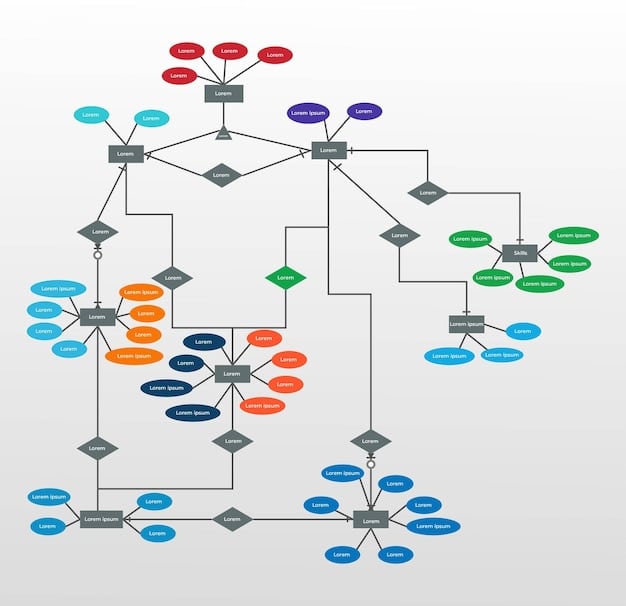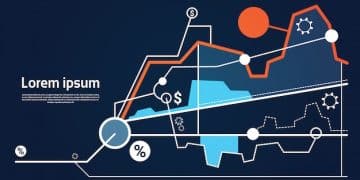AI’s Role in Business Operations: Practical Guide 2025

The adoption of artificial intelligence in business operations is rapidly transforming traditional workflows, offering opportunities for enhanced efficiency, data-driven decision-making, and significant competitive advantages in the global marketplace.
In today’s dynamic business landscape, the pursuit of efficiency and operational excellence is paramount. Traditional methods often encounter limitations when faced with complex, data-rich environments. This is where the role of Artificial Intelligence in streamlining business operations: A practical guide, emerges as a transformative force, reshaping how organizations function and thrive.
The Foundational Impact of AI on Business Efficiency
Artificial intelligence, often perceived as a futuristic concept, has firmly established itself as a cornerstone of modern business strategy. Its capacity to analyze vast datasets, automate repetitive tasks, and predict outcomes with remarkable accuracy offers unparalleled opportunities for operational enhancement. Businesses are no longer just considering AI; they are actively integrating it into their core processes to gain a competitive edge.
Understanding AI’s Core Capabilities in Business Contexts
At its heart, AI encompasses a range of technologies designed to simulate human intelligence. In a business setting, this translates into machines learning from data, adapting to new inputs, and performing tasks that typically require human cognition. This learning capability allows systems to evolve and improve over time, leading to continuous operational refinements.
- Automation of Repetitive Tasks: AI excels at handling high-volume, low-complexity tasks, freeing human employees for more strategic work.
- Data Analysis and Insights: Machine learning algorithms can uncover patterns and correlations in data that human analysts might miss.
- Predictive Analytics: AI models can forecast future trends, from sales figures to equipment maintenance needs, enabling proactive decision-making.
- Enhanced Customer Experience: Chatbots and personalized recommendation engines powered by AI significantly improve customer interactions.
The strategic deployment of AI allows companies to move beyond mere incremental improvements. It fosters a paradigm shift, enabling organizations to rethink their entire operational framework, from supply chain management to customer service. The insights generated by AI are not just data points; they are actionable intelligence that drives smarter, faster business decisions.

Transforming Customer Service with AI and Automation
Customer service is often the frontline of a business, shaping perceptions and driving loyalty. In the past, managing customer inquiries could be a resource-intensive endeavor, often leading to delays and inconsistent experiences. AI, however, is fundamentally changing this dynamic, enabling businesses to deliver superior service with unprecedented efficiency.
AI-Powered Chatbots and Virtual Assistants
One of the most visible applications of AI in customer service is the widespread adoption of chatbots and virtual assistants. These AI entities can handle a vast array of customer queries, from basic FAQs to complex troubleshooting, 24/7. Their ability to process natural language allows for more human-like interactions, significantly improving response times and customer satisfaction.
Beyond simply answering questions, advanced chatbots can integrate with CRM systems, drawing on customer history to provide personalized support. This level of customization was once unimaginable for large-scale operations, but AI makes it readily achievable, ensuring each customer feels valued and understood.
Predictive Service and Proactive Engagement
AI’s role extends beyond reactive problem-solving. Through predictive analytics, AI systems can anticipate customer needs or potential issues before they even arise. For example, by analyzing user behavior patterns on a website, an AI can proactively offer assistance or information, guiding the customer towards a successful outcome. This proactive approach minimizes frustration and enhances the overall customer journey.
- Personalized Recommendations: AI analyzes past purchases and browsing history to suggest relevant products or services.
- Sentiment Analysis: AI can gauge customer emotions from text or voice, allowing agents to tailor their approach and de-escalate situations.
- Automated Routing: AI efficiently directs complex queries to the most appropriate human agent, reducing transfer times.
By automating routine inquiries and providing intelligent support, AI frees human customer service representatives to focus on more complex, empathetic, and strategic interactions. This symbiotic relationship between AI and human agents elevates the quality of customer service, turning potential frustrations into opportunities for positive engagement and stronger customer relationships.
Optimizing Supply Chain and Logistics through AI
The modern supply chain is a sprawling, intricate network, susceptible to disruptions from countless variables, from external economic shifts to unforeseen weather events. Managing this complexity efficiently has historically been a monumental challenge. AI offers a powerful suite of tools to not just manage, but truly optimize, these intricate operations.
Demand Forecasting and Inventory Management
One of the most critical areas where AI shines is in predictive analytics for demand. Traditional forecasting methods often rely on historical data, which can be limited in accounting for sudden market shifts. AI algorithms, however, can process vast, diverse datasets—including social media trends, news reports, and real-time sales data—to create highly accurate demand forecasts. This allows businesses to optimize inventory levels, minimizing both stockouts and excess stock, which directly impacts profitability.
Intelligent inventory systems powered by AI can automatically trigger reorders, recommend optimal warehouse placements, and even predict potential bottlenecks, allowing for proactive adjustments before issues escalate. This precision significantly reduces carrying costs and improves cash flow.
Route Optimization and Logistics Efficiency
Transporting goods efficiently is another key component of a robust supply chain. AI-driven logistics platforms can analyze real-time traffic conditions, weather patterns, delivery schedules, and even driver availability to calculate the most efficient routes. This not only saves on fuel costs and reduces delivery times but also contributes to a lower carbon footprint.
- Predictive Maintenance: AI can monitor vehicle and machinery performance to predict failures, scheduling maintenance proactively to avoid costly breakdowns.
- Warehouse Automation: Robotics and AI-powered systems can streamline picking, packing, and sorting processes, vastly increasing throughput.
- Risk Management: AI can identify potential supply chain risks, such as geopolitical instability or supplier financial distress, enabling contingency planning.
The integration of AI throughout the supply chain transforms it from a reactive system into a highly responsive, predictive, and resilient network. From raw materials to final delivery, AI ensures that every link in the chain operates with maximum efficiency, leading to significant cost savings and improved reliability for both businesses and their customers.
Enhancing Marketing and Sales with AI-Driven Insights
In the highly competitive arenas of marketing and sales, understanding the customer and predicting market trends are critical for success. AI is revolutionizing these functions by providing unprecedented insights and automating crucial processes, allowing businesses to engage with their audience more effectively and close deals more efficiently.
Personalized Customer Engagement and Segmentation
Gone are the days of one-size-fits-all marketing. AI enables hyper-personalization by analyzing individual customer data—their browsing history, purchase patterns, interactions with previous campaigns—to create highly tailored marketing messages. This level of customization ensures that each customer receives content that is most relevant to their interests, significantly increasing engagement rates.
Moreover, AI can segment customer bases into highly granular groups, allowing marketers to target specific demographics with precision. This intelligent segmentation not only improves campaign effectiveness but also optimizes advertising spend by focusing resources on the most promising leads.
Predictive Sales and Lead Scoring
For sales teams, AI offers invaluable tools for identifying and nurturing high-potential leads. Predictive analytics can score leads based on their likelihood to convert, taking into account various behavioral and demographic factors. This allows sales representatives to prioritize their efforts, focusing on prospects who are most likely to become customers.
AI can also forecast sales trends, helping businesses anticipate market shifts and adjust their strategies accordingly. This proactive approach minimizes missed opportunities and allows for more accurate budgeting and resource allocation within the sales department. Machine learning algorithms can even suggest optimal pricing strategies based on real-time market dynamics.
- Content Generation: AI can assist in generating marketing copy, social media posts, and even personalized email content at scale.
- Ad Optimization: AI algorithms continuously refine ad placements and bidding strategies to maximize ROI on digital advertising campaigns.
- Customer Lifetime Value Prediction: AI helps identify customers who are likely to remain loyal and those at risk of churning, enabling targeted retention efforts.
By leveraging AI, marketing and sales departments can move beyond intuition-based decisions to a data-driven approach. This translates into more effective campaigns, higher conversion rates, and ultimately, stronger revenue growth. AI transforms sales and marketing from a guessing game into a precise, predictive discipline.

Enhancing Cybersecurity and Risk Management with AI
As businesses become increasingly digital, they also become more vulnerable to cyber threats. The sheer volume and sophistication of these threats make manual detection and response nearly impossible. This is where AI plays a pivotal, transformative role, providing advanced capabilities for protecting sensitive data and mitigating risks.
Proactive Threat Detection and Prevention
AI systems can monitor network traffic, user behavior, and system logs in real-time, detecting anomalies that might indicate a cyber attack. Unlike traditional rule-based security systems, AI can identify novel threats and adapt to evolving attack patterns, recognizing even subtle deviations from normal activity. This allows for proactive defense, often neutralizing threats before they can cause significant damage.
Machine learning algorithms are trained on vast datasets of both legitimate and malicious activities, enabling them to distinguish between benign events and genuine threats with high accuracy. This reduces false positives, allowing security teams to focus on critical incidents.
Automated Incident Response and Vulnerability Management
Once a threat is detected, AI can initiate automated responses, such as isolating affected systems, blocking malicious IP addresses, or triggering alerts to security personnel. This rapid response capability significantly minimizes the impact of breaches, containing them before they can spread throughout the network. Automated incident response is crucial in an era where cyberattacks can unfold in mere seconds.
- Behavioral Analytics: AI profiles normal user and system behavior, flagging deviations that could indicate insider threats or compromised accounts.
- Vulnerability Scanning: AI-powered tools can continuously scout for vulnerabilities in software and network configurations, recommending timely patches.
- Fraud Detection: In financial services, AI analyzes transaction patterns to detect and prevent fraudulent activities in real-time.
Beyond immediate threat detection, AI also assists in long-term risk management. It can analyze past incidents and emerging threat landscapes to identify potential weaknesses in an organization’s security posture. By providing data-driven insights into risks, AI empowers businesses to make informed decisions about security investments, ensuring comprehensive protection against a constantly evolving array of cyber threats.
Navigating the Challenges and Ethical Considerations of AI Adoption
While the benefits of AI in streamlining business operations are undeniable, its widespread adoption also comes with a unique set of challenges and ethical considerations. Thoughtful planning and proactive management are essential to harness AI’s power responsibly and effectively.
Data Privacy and Security Concerns
AI systems are heavily reliant on data. This necessitates robust data governance frameworks to ensure privacy, compliance with regulations like GDPR and CCPA, and data security. The collection, storage, and processing of vast amounts of sensitive information must be handled with the utmost care to avoid breaches and maintain public trust. Organizations must implement transparent data practices and invest in state-of-the-art encryption and access controls.
Moreover, the ethical implications of using personal data for AI insights must be carefully considered. Businesses need to ensure they are using data in ways that are fair, unbiased, and respectful of individual privacy rights.
Algorithmic Bias and Explainability
AI algorithms learn from the data they are fed. If that data contains historical biases—whether conscious or unconscious—the AI system can perpetuate and even amplify those biases. This can lead to unfair or discriminatory outcomes in areas like hiring, loan approvals, or even customer service. Addressing algorithmic bias requires diverse datasets, careful auditing of AI models, and continuous monitoring.
Another challenge is the “black box” problem, where complex AI models make decisions without clearly explaining how they arrived at a particular conclusion. For critical business functions, especially in regulated industries, the ability to explain an AI’s decision-making process (explainable AI or XAI) is crucial for accountability and trust.
- Job Displacement: As AI automates tasks, there are concerns about its impact on the workforce, necessitating reskilling and upskilling initiatives.
- Implementation Costs: Deploying complex AI solutions can be expensive, requiring significant investment in technology, talent, and infrastructure.
- Regulatory Compliance: The legal and regulatory landscape for AI is still evolving, posing challenges for businesses seeking to remain compliant in a dynamic environment.
Successfully integrating AI means confronting these challenges head-on. It requires a holistic approach that considers not just the technical aspects but also the human, ethical, and societal implications. Businesses that prioritize responsible AI development and deployment will be better positioned to reap its many benefits while mitigating potential pitfalls, building trust with their stakeholders along the way. This forward-looking perspective is crucial for sustainable AI success.
The Future of AI in Business Operations: Trends and Outlook
As Artificial Intelligence continues its rapid evolution, its impact on business operations is poised to expand even further. The coming years will likely witness advancements that transcend current capabilities, leading to more integrated, autonomous, and intelligent business environments. Understanding these emerging trends is crucial for businesses aiming to stay at the forefront of innovation.
Hyperautomation and Autonomous Operations
One of the most significant trends is the move towards hyperautomation, where AI combines with other emerging technologies like Robotic Process Automation (RPA), Machine Learning, and low-code platforms to automate virtually every process within an organization that can be automated. This isn’t just about individual task automation; it’s about connecting disparate systems and workflows to create a seamless, self-optimizing operational fabric.
Ultimately, this will lead to increasingly autonomous operations, where AI systems can independently manage complex workflows, anticipate issues, and even self-correct without human intervention. This shift will free human capital for highly strategic, creative, and interpersonal roles, redefining the nature of work itself.
Empowering Edge AI and Explainable AI (XAI)
The rise of edge AI, where AI processing is done closer to the data source (on devices rather than in the cloud), will enable faster, more secure, and more efficient real-time decision-making for various operational tasks. This is particularly crucial for industries like manufacturing and logistics, where immediate responses are often critical.
- AI-Powered Decision Intelligence: Systems will not just analyze data but also provide actionable recommendations, moving beyond insights to full-fledged decision support.
- Democratization of AI: User-friendly AI tools and platforms will become more accessible, allowing non-specialists to leverage AI for their specific operational needs.
- Human-AI Collaboration: The focus will increasingly shift towards creating systems where humans and AI work synergistically, augmenting each other’s strengths rather than replacing one another.
The future of AI in business operations is not just about technological advancement; it’s about reimagining organizational structures, fostering a culture of continuous learning, and integrating ethical considerations from the outset. Businesses that proactively embrace these trends, invest in responsible AI development, and prioritize human-AI collaboration will be best positioned to unlock unprecedented levels of efficiency, innovation, and sustainable growth in the decades to come.
| Key Area | AI’s Impact |
|---|---|
| 📊 Operations & Efficiency | Streamlines workflows, automates tasks, and provides data insights. |
| 📞 Customer Service | Enhances interactions with chatbots and proactive support. |
| 🔗 Supply Chain | Optimizes forecasting, inventory, and logistics for resilience. |
| 🛡️ Security & Risk | Provides advanced threat detection and automated response. |
Frequently Asked Questions about AI in Business Operations
▼
AI excels in streamlining operations that are data-intensive, repetitive, or require predictive analysis. Key areas include customer service (chatbots, personalized support), supply chain management (demand forecasting, logistics optimization), marketing and sales (lead scoring, personalization), and cybersecurity (threat detection, fraud prevention). These applications significantly reduce manual effort and improve decision quality.
▼
AI reduces costs by automating tasks, leading to decreased labor expenses and fewer human errors. In supply chains, it optimizes inventory and logistics, minimizing waste and transportation costs. Predictive maintenance prevents expensive equipment breakdowns. Furthermore, AI’s ability to analyze vast data for efficiency gains often leads to optimized resource allocation across the entire organization, translating directly to cost savings.
▼
Challenges in AI implementation often include high initial investment costs for technology and talent, ensuring data quality and privacy, and addressing algorithmic bias. Additionally, managing the cultural shift within the organization and potential job displacement concerns require careful planning and employee reskilling. Regulatory compliance in a rapidly evolving AI landscape also presents a significant hurdle for many businesses.
▼
Absolutely. While large enterprises might have dedicated AI departments, SMBs can leverage off-the-shelf AI tools and cloud-based AI services. Solutions like AI-powered CRM systems, marketing automation platforms, and even intelligent accounting software are becoming increasingly accessible and affordable. Focusing on specific, high-impact areas can provide significant returns for SMBs, allowing them to compete more effectively.
▼
AI profoundly impacts decision-making by transforming it from intuition-based to data-driven. It provides deeper insights, identifies patterns, and offers predictive analytics that human analysis alone cannot achieve. This leads to more informed, accurate, and proactive decisions across all business functions, from strategic planning to day-to-day operational adjustments, enhancing overall business agility and responsiveness.
Conclusion
The integration of Artificial Intelligence into business operations is no longer a futuristic concept but a present-day imperative for organizations seeking to thrive in a competitive global market. From revolutionizing customer service and optimizing supply chains to bolstering cybersecurity and driving smarter marketing strategies, AI’s transformative potential is undeniable. While challenges such as data privacy and algorithmic bias require careful navigation, the continuous advancements in AI technology promise an era of unprecedented efficiency, innovation, and strategic advantage. Businesses that strategically embrace AI, fostering a culture of responsible adoption and continuous learning, are poised not just to streamline their operations but to redefine their very capabilities for sustainable growth and enduring success.





